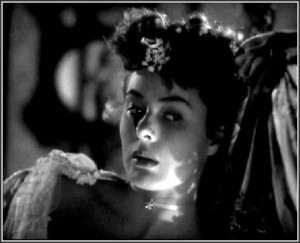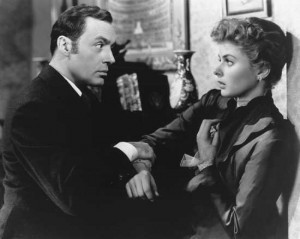In the Shadow of Gaslight
 I watched it last night. I'd seen it before, many years ago, and I remember it being eerily fascinating. I did not remember how uncomfortable it made me. Perhaps it did not then. Perhaps, so many years later, I have more reason to be made uncomfortable by the subject matter than I did when I was a teenager.
I watched it last night. I'd seen it before, many years ago, and I remember it being eerily fascinating. I did not remember how uncomfortable it made me. Perhaps it did not then. Perhaps, so many years later, I have more reason to be made uncomfortable by the subject matter than I did when I was a teenager.
My desire to see it again was sparked by an article sent to me by a friend. Since then, it's been passed around quite a bit, and I do believe it's something everyone should read. In fact, it makes me wonder if, in writing this, I'm really not writing a continuation (sort of) of my post last week. "Why it Matters." You see, I believe History, and Historical Fiction especially, to be relevant. There's a reason it's on the rise. People are missing something. And, at the same time, I think we subconsciously know that the injustices we fought so hard against, challenged policy makers and world leaders, campaigned and protested and even fought wars for, are really just as rampant now. Only they have taken on new disguises. "Gaslight" unravels a bit of that and provides a very interesting example.
The article in question came from the Huffington Post, and is entitled, "A Message to Women From a Man: You Are Not Crazy" by Yashar Ali. THe article casts some light on a psychological phenomenon called 'Gaslighting' by telling us a bit about the movie that inspired the term. Gaslight (it can be watched via Amazon's Instant Video program) is Historical Fiction in itself. Filmed in 1944, the events take place (I'm guessing by the costume) in the 1890′s. Ingrid Bergman's character, Paula, witnesses, as a young girl, the murder of the aunt who raised her. She is thereafter sent to take music lessons from the man who taught her aunt, a famous singer. While under his tutelage, she is courted by the accompanist and though she is uncertain of him, she does agree to marry him. He hardly gives her a chance to say otherwise. By a trick of clever manipulation, he convinces her she wants to give him the home she inherited in London, a house she has never returned to since the death of her beloved aunt.
Upon arriving there, her husband insists they receive no visitors and keep to themselves. His excuse, at first, is that they are still honeymooning. But then, later on, he begins to plant the idea in her mind that she is not quite well, not emotionally, certainly not mentally. She is forgetting things, losing things, taking things without remembering. In order to calm her fears of the house, he has all of her aunt's things removed to the attic and the attic boarded up.
Mr. Anton is a musician and an aspiring composer, but cannot work at home. At night he goes out to a room he has rented. But it's when he's  gone that the house truly haunts her. Alone in her room she notices the gaslights dim, as though someone were in the house. But no one is, the servants assure her. She hears footsteps above in the attic, but the housekeeper, who is deaf, cannot hear them, and her husband, when she tells him of the strange occurrences, insists she is imagining things. By small means he tightens the screw until she believes herself loosing her grip on reality. Her husband threatens to have her committed. By having her put away, he can search the attic quite openly, rather than under cover of darkness, for the jewels he knows are in the house. It was why, after all, he murdered Paula's aunt. It is why, after all, he convinced Paula to marry him and to bring him back to this house, so that he could continue the search she interrupted so many years ago.
gone that the house truly haunts her. Alone in her room she notices the gaslights dim, as though someone were in the house. But no one is, the servants assure her. She hears footsteps above in the attic, but the housekeeper, who is deaf, cannot hear them, and her husband, when she tells him of the strange occurrences, insists she is imagining things. By small means he tightens the screw until she believes herself loosing her grip on reality. Her husband threatens to have her committed. By having her put away, he can search the attic quite openly, rather than under cover of darkness, for the jewels he knows are in the house. It was why, after all, he murdered Paula's aunt. It is why, after all, he convinced Paula to marry him and to bring him back to this house, so that he could continue the search she interrupted so many years ago.
Paula is not crazy. Mr. Anton is a genuine manipulator.
And here is where Mr. Ali draws his comparison, by showing how often such tactics are still used today. How many of us grow up believing we are hysterical and crazy? How many times do we, in our communications with our bosses and our more dominant counterparts (I will not insist that only men do this) do we find ourselves being accused of being crazy or irrational simply because we dare to react to the way people are treating us? Or, on Facebook, or Twitter, or anywhere else where opinions are shared freely, do we not find ourselves accused of being uneducated, or small minded, or just insane, because we do not see life the same way as another? I have a very dear friend who on occasion likes to suggest I'm irrational simply because his over-rational mind leads him to conclusions my more intuitive one does not. (For fairness sake, I do not believe he does it on purpose to make me feel bad. I think he truly believes me irrational.) I'm not any less sane or even right than he is. I just see things differently.
Yet women certainly are targeted as weaker, emotionally and psychologically, just as often as they were, and perhaps in far more insidious ways, than they were a hundred or so years ago. Women used to have a right to expect to be treated with a certain amount of respect. A gentleman who had nefarious motives had to be quite suave to get his way. Now women are as knowledgeable about the world as men, and yet, somehow, they've convinced us that to keep their attention, we must be open to doing and being just exactly what they want. Toys. Men don't have to hide their motives. Men want easy conquests, and we give them that. What does this do for us? It enslaves us once again, but more securely, for now there is no law to fight, no unjust institution keeping us bound as property. We have made it of ourselves. It makes me want to scream and throw things.
And it makes me want to cheer when a woman can find a way to rationally make her point. When she has the courage to stand up and fight for what is rightly hers. Most especially when it is that most precious of all things: SELF.
Women today, young women in particular, are growing up in an environment inherently threatening to them. They didn't create it. It was given to them by we who made it possible. What woman is safe today? The statistics say that one in three women reports being the victim of sexual abuse at some point in their lives. That's REPORTS! My feeling is that there are far more. I never reported my abuser. Did you?
Young women growing up in this environment read what they know, what resonates with them. They read (and watch) of Vampires and Werewolves and damsels in distress. Women who need, and desperately, protection. And we wonder why entertainment has become so dark. It's no wonder. Not really. It's because they feel like they have to wage an all out war to preserve themselves.
Just ask them if they don't.
There is another movie that comes to mind. It's a modern film, quite modern, in fact. It got horrible reviews, but I'm of the opinion that people really didn't get it. And those who did were offended because it was a message leveled right at their midsections, and they were not expecting it. The movie? It's aptly enough titled.
I'll write more on that in the near future. In the mean time. See it. Watch it. Think about it. It's saying something really uncomfortable about our day and age. It's asking some very hard questions and pointing some very sharp accusatory fingers. It is, to my mind, the most moralistic, socially provoking movie of this century so far. It blew me away. (For a clue as to why, read this.)
Watch it. Think about it. Now.
And let's discuss.




